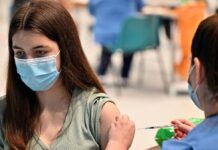Around eight in 10 adults in most parts of the UK are now likely to have Covid-19 antibodies, new figures suggest.
The estimates range from 79.9% of adults in Northern Ireland to 80.3% in England and 82.7% in Wales.
In Scotland the estimate is slightly lower, at just over seven in 10 adults or 72.6%.
Data show #COVID19 antibody positivity rates continued to increase across the UK in recent weeks.
Our latest release looks at antibody levels and the percentage of people vaccinated across the nations of the UK https://t.co/ZCCiqfFNbw pic.twitter.com/3cifpgkBW9
— Office for National Statistics (ONS) (@ONS) June 9, 2021
The presence of Covid-19 antibodies suggests someone has had the infection in the past or has been vaccinated.
It takes between two and three weeks after infection or vaccination for the body to make enough antibodies to fight the virus.
The latest estimates are from the Office for National Statistics (ONS) and are based on a sample of blood test results for the week beginning May 17.
The estimates are for people in private households and do not include settings such as hospitals and care homes.
In both England and Northern Ireland, the latest estimate of eight in 10 adults is up from around seven in 10 a month ago, while in Wales the estimate of eight in 10 is up from around two-thirds of adults.
For Scotland the estimate is up month-on-month from around six in 10 to just over seven in 10.
The ONS said there is a clear pattern between vaccination and testing positive for Covid-19 antibodies but the detection of antibodies alone is not a precise measure of the immunity protection given by vaccination.
Once infected or vaccinated, the length of time antibodies remain at detectable levels in the blood is not fully known.
It is also not yet known how having detectable antibodies, now or at some time in the past, affects the chance of getting Covid-19 again.







